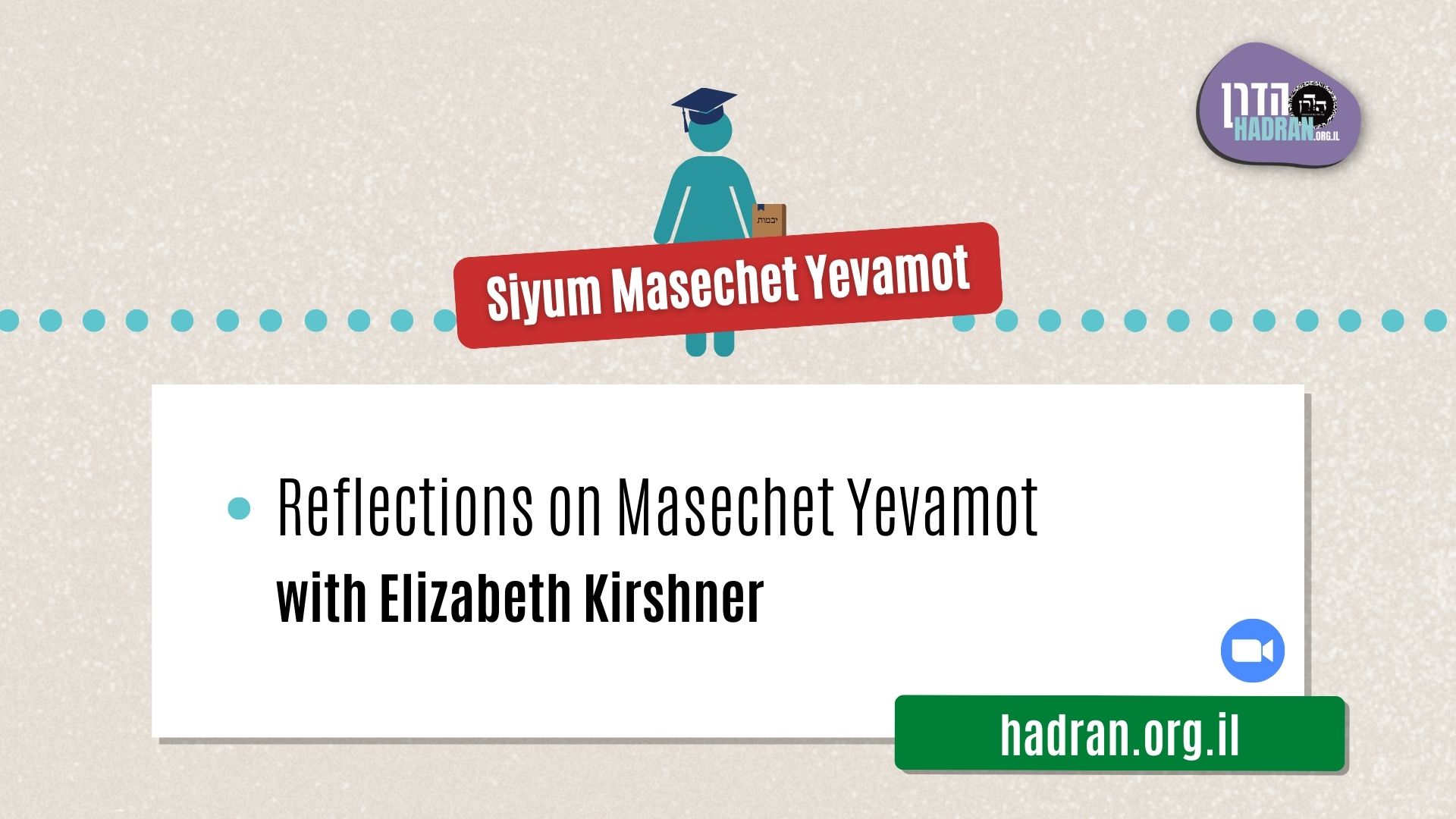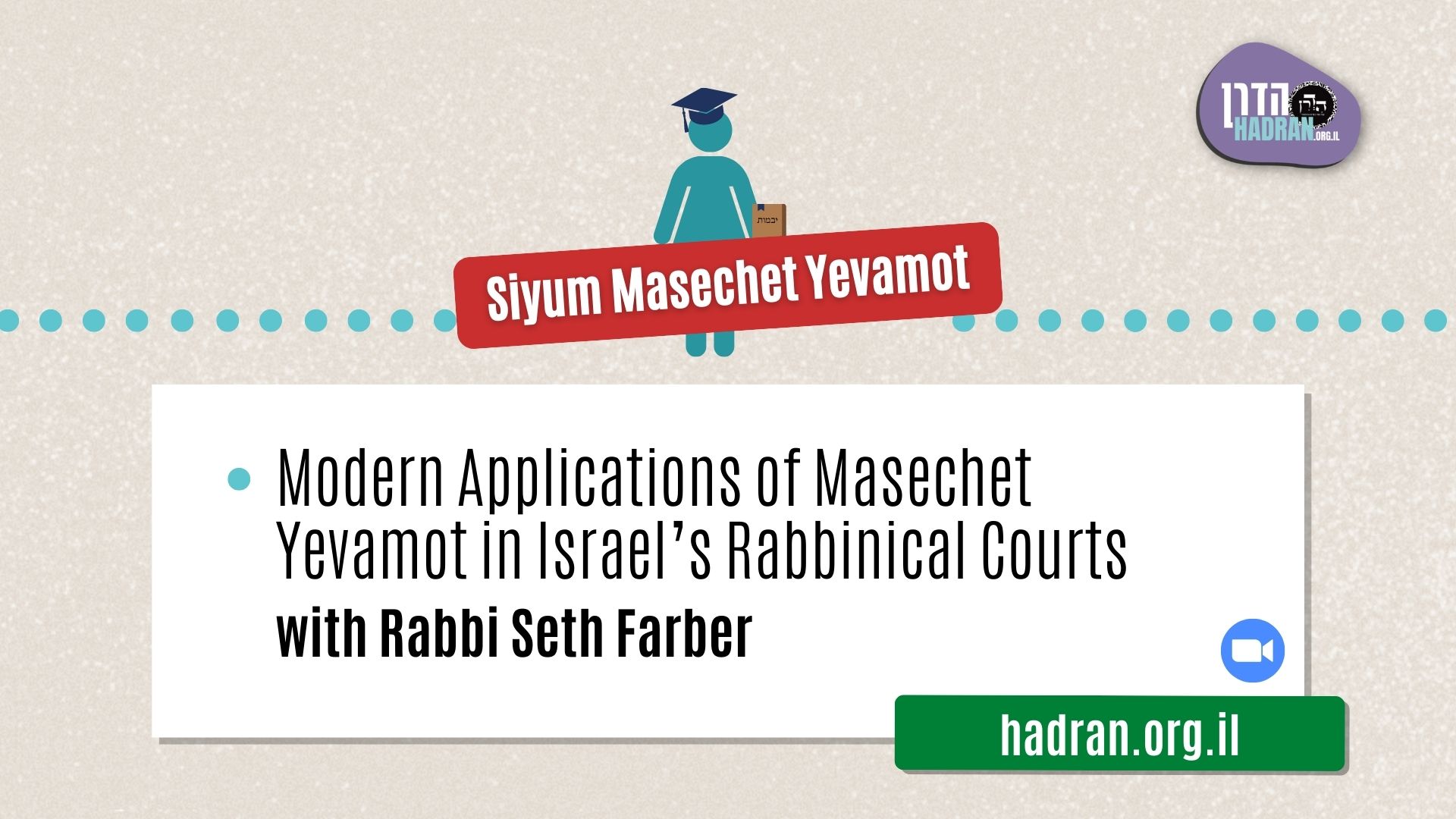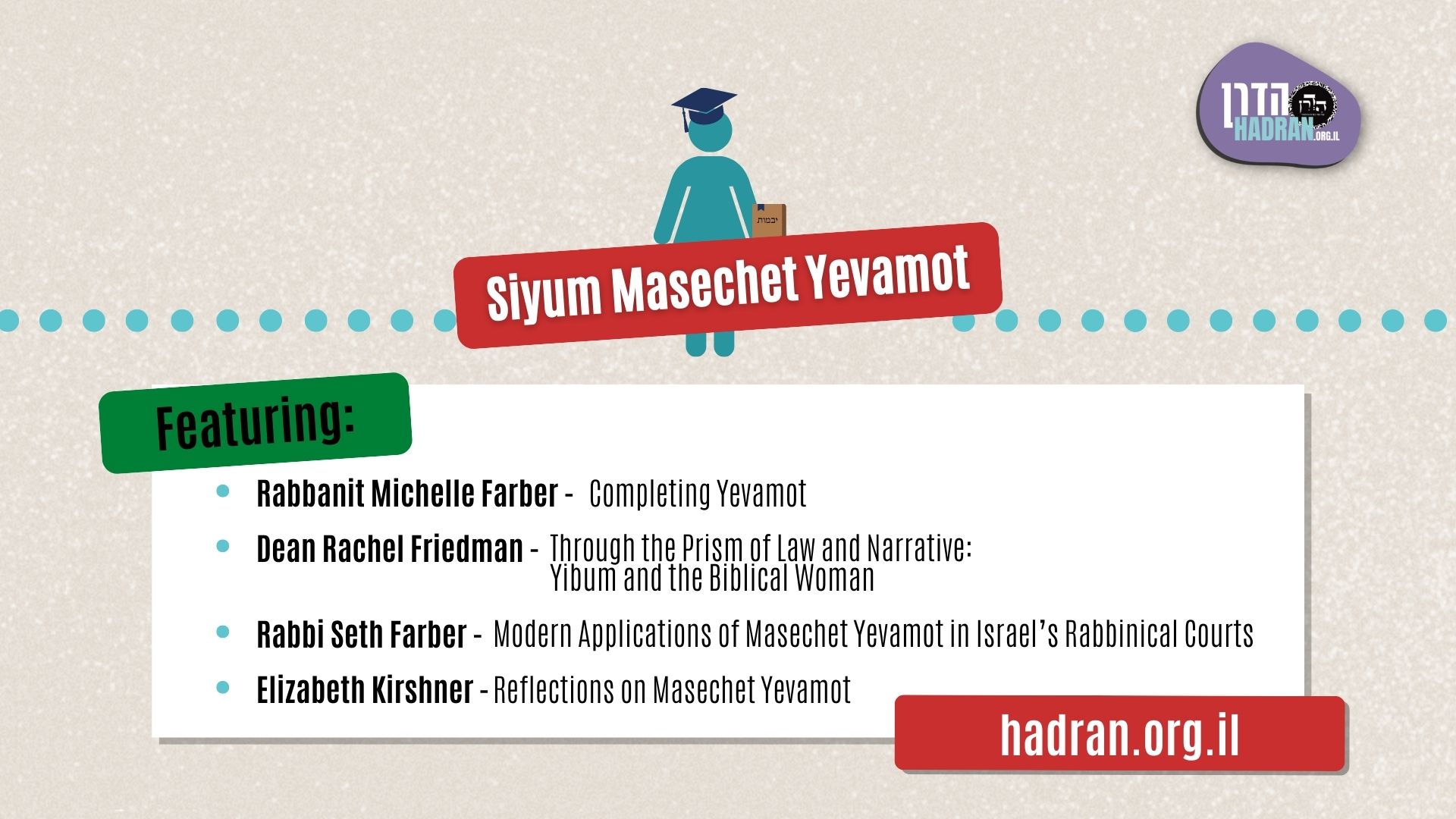Why didn’t Abaye question Raba from the ketuba in our Mishna where the woman’s family has a non-definitive claim to her money while the yabam has a definitive claim (as the property is in his possession) and yet they split the proceeds according to Beit Shamai? To answer that question, they reread the Mishna and claim that Beit Shamai wasn’t relating to that case. Abaye brings a third explanation of the two parts of the Mishna by distinguishing between when the property came to the woman. The first part is referring to property given to her when she was waiting for yibum, therefore the yabam has no claim to the property. The second was referring to property that was given to her when she was married to the first husband, which would then go by default to the yabam upon the husband’s death. According to Abaye, the debate between Beit Shamai and Beit Hillel regards whether or not the husband’s hand is considered like the wife’s hand in her possession or is it stronger than the wife’s hand. The yabam‘s hand will always be weaker than the original husband – if so, he will either have as much power as the woman or less. Rava beings a fourth explanation of the Mishna – the first part is when the yabam did not yet do maamar and in the second part he did do maamar. Those who agree/disagree with Rava each have different understandings of Beit Shamai’s position regarding maamar – did Beit Shamai just say it was strong enough to exempt her relative (i.e. if her sister fell to yibum to the yabam that she did maamar with). Or is it strong enough to give him rights to her property? Rav Papa thinks that the Mishna fits best with Abaye’s reading, except for the fact that the second part is about the woman dying when it could have easily brought the case of her still alive and regarding the produce. The Mishna stated that she is his wife for all intents and purposes – for what purposes? Why is this necessary to have been mentioned? Ideally the oldest brother should do yibum. But if he does not, the court asks each of the brothers. In the event that no one wants to do it, the court goes back to the oldest brother and requires him to do it. One does not wait for a brother who is not available at present to do yibum if there are others to do it. There are two versions of a dispute between Rabbi Yochanan and Rabbi Yehoshua ben Levi. The first version is if there is a younger brother who will do yibum or an older brother who will do chalitza, which is preferable. In the second version, all agree that a younger brother who will do yibum is preferable, but the debate is regarding chalitza – is there a preference for the older brother or is he and a younger brother equal if they are only doing chalitza? Our Mishna is brought according to each version to try to prove on or the other opinion but all attempts are unsuccessful. A Mishan is Bechorot 13a states that originally yibum was preferable, but now chalitza is preferable as people are not doing yibum with the intention of the mitzva. Rav stills holds, though, that the choice is up to the brother and we do not force him to do chalitza. Rami bar Hama holds that the law changed yet again and yibum is ideal. Why? The Gemara explains his position that they originally held like Abba Shaul that one cannot perform yibum unless one only intends to perform the mitzva, but not because he finds her beautiful or just wishes to marry her. But then they held like the rabbis who permitted yibum in any case. A braita is brought that is explained in two different ways – one way to match Abba Shaul and the other to match the rabbis.
This week’s learning is sponsored for the merit and safety of Haymanut (Emuna) Kasau, who was 9 years old when she disappeared from her home in Tzfat two years ago, on the 16th of Adar, 5784 (February 25, 2024), and whose whereabouts remain unknown.
This week’s learning is dedicated of the safety of our nation, the soldiers and citizens of Israel, and for the liberation of the Iranian people. May we soon see the realization of “ליהודים היתה אורה ושמחה וששון ויקר”.
This week’s learning is sponsored for the merit and safety of Haymanut (Emuna) Kasau, who was 9 years old when she disappeared from her home in Tzfat two years ago, on the 16th of Adar, 5784 (February 25, 2024), and whose whereabouts remain unknown.
Want to dedicate learning? Get started here:


Today’s daily daf tools:
This week’s learning is sponsored for the merit and safety of Haymanut (Emuna) Kasau, who was 9 years old when she disappeared from her home in Tzfat two years ago, on the 16th of Adar, 5784 (February 25, 2024), and whose whereabouts remain unknown.
This week’s learning is dedicated of the safety of our nation, the soldiers and citizens of Israel, and for the liberation of the Iranian people. May we soon see the realization of “ליהודים היתה אורה ושמחה וששון ויקר”.
This week’s learning is sponsored for the merit and safety of Haymanut (Emuna) Kasau, who was 9 years old when she disappeared from her home in Tzfat two years ago, on the 16th of Adar, 5784 (February 25, 2024), and whose whereabouts remain unknown.
Today’s daily daf tools:
Delve Deeper
Broaden your understanding of the topics on this daf with classes and podcasts from top women Talmud scholars.
New to Talmud?
Check out our resources designed to help you navigate a page of Talmud – and study at the pace, level and style that fits you.
The Hadran Women’s Tapestry
Meet the diverse women learning Gemara at Hadran and hear their stories.
Yevamot 39
וְקָסָבַר אַבָּיֵי יָדוֹ כְּיָדָהּ.
And Abaye holds that according to Beit Hillel, with regard to the husband’s rights to his wife’s property, his hand is like her hand, but not any stronger. Accordingly, the yavam has a weaker hand in her property than she does, because the rights of a yavam are always weaker than those of the husband himself. Therefore, she is considered to be in possession of the property, and when she dies, her heirs, i.e., her father and his heirs, inherit it. However, Beit Shammai assume that the husband’s hand is stronger than his wife’s hand. Therefore, the hand of the yavam, which is weaker than the husband’s hand, is nevertheless equally as strong as the hand of the yevama, and therefore they rule that if she dies, the yavam and her heirs divide up the property.
אֲמַר לֵיהּ רָבָא: אִי דְּנָפְלִי לָהּ כְּשֶׁהִיא תַּחְתָּיו דְּבַעַל — דְּכוּלֵּי עָלְמָא לָא פְּלִיגִי דְּיָדוֹ עֲדִיפָא מִיָּדָהּ.
Rava said to him: I hold that if the property was bequeathed to her when she was still under the first husband, everyone, i.e., both Beit Hillel and Beit Shammai, agrees that his hand is stronger than her hand, and therefore the hand of the yavam will be equally as strong as that of the yevama, and if she dies the property will be divided between the two sides.
אֶלָּא אִידֵּי וְאִידֵּי דְּנָפְלוּ לָהּ כְּשֶׁהִיא שׁוֹמֶרֶת יָבָם. רֵישָׁא דְּלָא עֲבַד בַּהּ מַאֲמָר, סֵיפָא דַּעֲבַד בַּהּ מַאֲמָר.
Therefore, Rava presents his own resolution to the apparent inconsistency in Beit Shammai’s rulings in the mishna: Rather, both this first clause and that latter clause concern cases in which property was bequeathed to her when she was a widow waiting for her yavam. The first clause concerns a case in which the yavam had not performed a levirate betrothal with her, and the latter clause concerns a case in which he had performed a levirate betrothal with her.
וְקָסָבַר רָבָא מַאֲמָר לְבֵית שַׁמַּאי עוֹשֶׂה וַדַּאי אֲרוּסָה וּסְפֵק נְשׂוּאָה. וַדַּאי אֲרוּסָה — לִדְחוֹת בַּצָּרָה, וּסְפֵק נְשׂוּאָה — לַחְלוֹק בַּנְּכָסִים.
The Gemara explains the rationale behind Rava’s explanation: And Rava holds that according to Beit Shammai a levirate betrothal with a yevama affords her a status equivalent in some aspects to a woman who is definitely betrothed and in other aspects to a woman about whom there is uncertainty whether she is married. The Gemara elucidates: She is similar to a woman who is definitely betrothed with regard to nullifying the levirate bond of her rival wife, so that the rival wife need not perform levirate marriage or ḥalitza. And she is similar to a woman about whom there is uncertainty whether she is married with regard to empowering the yavam to divide up the property that she attained while she was waiting for her yavam.
אִיתְּמַר מִשְּׁמֵיהּ דְּרַבִּי אֶלְעָזָר כְּווֹתֵיהּ דְּרָבָא, וְאִיתְּמַר מִשְּׁמֵיהּ דְּרַבִּי יוֹסֵי בְּרַבִּי חֲנִינָא כְּווֹתֵיהּ דְּאַבָּיֵי.
The Gemara notes: An interpretation of the mishna was stated in the name of Rabbi Elazar that is in accordance with the opinion of Rava. And an interpretation of the mishna was stated in the name of Rabbi Yosei, son of Rabbi Ḥanina that is in accordance with the opinion of Abaye.
וּמִי אָמַר רַבִּי אֶלְעָזָר הָכִי? וְהָא אָמַר רַבִּי אֶלְעָזָר: מַאֲמָר לְבֵית שַׁמַּאי אֵינוֹ קוֹנֶה אֶלָּא לִדְחוֹת בַּצָּרָה בִּלְבָד!
The Gemara objects: And did Rabbi Elazar actually state this interpretation that is in accordance with the opinion of Rava? But didn’t Rabbi Elazar say: According to Beit Shammai a levirate betrothal acquires the yevama only with regard to nullifying the levirate bond of a rival wife so that she need not perform levirate marriage or ḥalitza? This implies that it does not acquire her with regard to enabling the yavam to inherit from her. This, then, stands in contrast to Rava’s interpretation.
אֵיפוֹךְ. וְאִי בָּעֵית אֵימָא: לְעוֹלָם לָא תֵּיפוֹךְ — אָמַר לָךְ רַבִּי אֶלְעָזָר: כִּי אֲמַרִי אֲנָא, דְּלָא סַגִּי לַהּ בְּגֵט אֶלָּא דְּבָעֵי נָמֵי חֲלִיצָה. לַחְלוֹק בַּנְּכָסִים דְּלָא קָנֵי — מִי אֲמַרִי?
The Gemara offers two possible solutions: Reverse the opinions, so that Rabbi Elazar is in accordance with Abaye, and Rabbi Yosei, son of Rabbi Ḥanina, is in accordance with Rava. And if you wish, say instead: Actually, do not reverse the opinions, since Rabbi Elazar can be understood to be in accordance with the opinion of Rava, as Rabbi Elazar could have said to you: When I said the statement that implies that a levirate betrothal acquires in a very limited sense, the intention was only that its acquisition is limited in that giving her a bill of divorce is still insufficient for her in order to release her from the levirate bond; rather, she also needs to perform ḥalitza. But to suggest that he does not acquire her with regard to dividing up the property she attained, did I say that? Certainly not, as in fact a levirate betrothal acquires her to that extent as well, as Rava assumes.
אָמַר רַב פָּפָּא: דִּיּוּקָא דְּמַתְנִיתִין כְּווֹתֵיהּ דְּאַבָּיֵי, וְאַף עַל גַּב דְּקַשְׁיָא ״מֵתָה״.
Rav Pappa said: The precise formulation of the mishna is in accordance with the opinion of Abaye, even though according to his opinion it is difficult that the mishna discusses the case in which she died.
דְּקָתָנֵי: נְכָסִים הַנִּכְנָסִים וְיוֹצְאִים עִמָּהּ, מַאי ״נִכְנָסִין״ וּמַאי ״יוֹצְאִין״? לָאו ״נִכְנָסִין״ — לִרְשׁוּת הַבַּעַל, וְ״יוֹצְאִים״ — מֵרְשׁוּת הַבַּעַל לִרְשׁוּת הָאָב,
The Gemara explains Rav Pappa’s statement: The precise formulation of the mishna is in accordance with the opinion of Abaye, as it teaches: Her property that enters and leaves the marriage with her. What is the meaning of: That enters, and what is the meaning of: That leaves? Is it not: That enters into the domain of the husband and leaves the domain of the husband when she dies, and then enters into the domain of the father? Interpreted in this way, the mishna explicitly considers the period in which she was still married to her first husband, and likewise, the case in which she came into the possession of property should be understood as referring to a case in which she did so while still married. This is consonant with Abaye’s interpretation, but not with Rava’s.
וְאַף עַל גַּב דְּקַשְׁיָא ״מֵתָה״, אַדְּמִפַּלְגִי בְּגוּפַהּ וּלְאַחַר מִיתָה, לִפַּלְגוּ בְּחַיֶּיהָ וּלְפֵירוֹת.
And when Rav Pappa said: Even though according to his opinion it is difficult that the mishna discusses the case in which she died, he meant as follows: Instead of disputing who has the rights to the property itself, which necessitates considering the case after her death, let Beit Hillel and Beit Shammai dispute the more immediate case when she is still alive and dispute who has the rights to the use and produce of the property.
וְתוּ לָא מִידֵּי.
The Gemara concludes: And there is nothing more to say concerning this matter, i.e., as Rav Pappa noted, while it is undeniable that the mishna’s formulation supports Abaye’s interpretation, it is equally true that the case discussed by the mishna would appear to challenge his interpretation.
כְּנָסָהּ הֲרֵי הִיא כּוּ׳. לְמַאי הִלְכְתָא? אָמַר רַבִּי יוֹסֵי בַּר חֲנִינָא: לוֹמַר שֶׁמְּגָרְשָׁה בְּגֵט וּמַחְזִירָהּ.
§ The mishna states: If the yavam consummated the levirate marriage with her, then her legal status is that of his wife in every sense. The Gemara asks: With regard to what halakha is this said? Rabbi Yosei bar Ḥanina said: It is to say that once they have consummated the levirate marriage, the only way to legally dissolve the marriage is if he divorces her with a bill of divorce, but ḥalitza is of no avail, and after divorcing her, he is permitted to take her back to be his wife, as the prohibition against engaging in relations with one’s brother’s wife does not apply to her.
מְגָרְשָׁה בְּגֵט, פְּשִׁיטָא? סָלְקָא דַּעְתָּךְ אָמֵינָא, הוֹאִיל וּכְתִיב: ״וּלְקָחָהּ לוֹ לְאִשָּׁה וְיִבְּמָהּ״ — אָמַר רַחֲמָנָא: וַעֲדַיִין יִבּוּמֵי הָרִאשׁוֹן עָלֶיהָ, בַּחֲלִיצָה — אִין, בְּגֵט — לָא, קָא מַשְׁמַע לַן.
The Gemara examines the first clause of Rabbi Yosei bar Ḥanina’s statement: Isn’t it obvious that to sever his relationship with her, he divorces her with a bill of divorce? The Gemara explains: It is necessary to teach this because it could enter your mind to say that since it is written: “And take her to him to be his wife and consummate the levirate marriage with her” (Deuteronomy 25:5), continuing to refer to the marriage as a levirate marriage even after the verse has stated that he took her as a wife, one might claim the Merciful One is saying that the original levirate bond continues to be upon her, and therefore, with ḥalitza, yes, they can sever the relationship, but with a bill of divorce, no, the relationship would not be severed. Therefore, the mishna teaches us that she is considered to be his wife to the extent that the relationship can be severed with a bill of divorce alone.
מַחְזִירָהּ. פְּשִׁיטָא? סָלְקָא דַּעְתָּךְ אָמֵינָא, מִצְוָה דְּרַמְיָא רַחֲמָנָא עֲלֵיהּ — עַבְדַּהּ, הַשְׁתָּא תֵּיקוּם עֲלֵיהּ בְּאִיסּוּר אֵשֶׁת אָח, קָא מַשְׁמַע לַן.
The Gemara examines the second clause: Isn’t it obvious that after divorcing her, he is permitted to take her back to be his wife? The Gemara explains: It is necessary to teach this because it could enter your mind to say that the mitzva that the Merciful One imposes upon him, he has performed, and therefore now that there is no longer any mitzva to marry her, she should once again be established as forbidden to him by the prohibition against engaging in relations with one’s brother’s wife. To dispel this notion, the mishna teaches us that she is considered to be his wife to the extent that there is no longer any prohibition against remarrying her.
וְאֵימָא הָכִי נָמֵי? אָמַר קְרָא: ״וּלְקָחָהּ לוֹ לְאִשָּׁה״, כֵּיוָן שֶׁלְּקָחָהּ — הֲרֵי הִיא כְּאִשְׁתּוֹ לְכׇל דָּבָר.
The Gemara challenges this ruling: But why not say that this is indeed so, that she should be forbidden to him? The Gemara explains: The verse states: “And take her to him to be his wife” (Deuteronomy 25:5), indicating that once he has taken her, her legal status is that of his wife in every sense.
וּבִלְבַד שֶׁתְּהֵא כְּתוּבָּתָהּ כּוּ׳. מַאי טַעְמָא — אִשָּׁה הִקְנוּ לוֹ מִן הַשָּׁמַיִם.
§ The mishna states: The only exception to this is that her marriage contract will still be payable from the property of her first husband and not from the property of the yavam. The Gemara asks: What is the reason for this? The Gemara explains: A wife was acquired to him by Heaven, and since he did not choose her as a wife, he did not obligate himself to pay her marriage contract.
וְאִי לֵית לַהּ מִן הָרִאשׁוֹן — תַּקִּינוּ לַהּ מִשֵּׁנִי, כְּדֵי שֶׁלֹּא תְּהֵא קַלָּה בְּעֵינָיו לְהוֹצִיאָהּ.
The Gemara qualifies the mishna’s ruling: And if she has no ability to collect her marriage contract from the first husband, since he died without leaving any property with which to pay it, the Sages instituted an ordinance for her benefit that she must receive a new marriage contract from her second husband, i.e., the yavam. This was instituted so that she will not be demeaned in his eyes such that he will easily divorce her, since doing so would incur a financial burden on his part.
מַתְנִי׳ מִצְוָה בְּגָדוֹל לְיַיבֵּם. לֹא רָצָה — מְהַלְּכִין עַל כׇּל הָאַחִין. לֹא רָצוּ — חוֹזְרִין אֵצֶל גָּדוֹל וְאוֹמְרִים לוֹ, עָלֶיךָ מִצְוָה: אוֹ חֲלוֹץ, אוֹ יַיבֵּם.
MISHNA: The mitzva of levirate marriage is for the eldest of the brothers to consummate the levirate marriage. If the eldest does not want to do so, the court goes to each of the other brothers and requires them to do so. If they do not want to do so, the court returns to the eldest brother and says to him: The mitzva is incumbent upon you; either perform ḥalitza or consummate the levirate marriage.
תָּלָה בְּקָטָן עַד שֶׁיַּגְדִּיל, אוֹ בַּגָּדוֹל עַד שֶׁיָּבֹא מִמְּדִינַת הַיָּם, אוֹ חֵרֵשׁ אוֹ שׁוֹטֶה — אֵין שׁוֹמְעִין לוֹ, אֶלָּא אוֹמְרִים לוֹ: עָלֶיךָ מִצְוָה, אוֹ חֲלוֹץ אוֹ יַיבֵּם.
If a brother made his decision dependent upon the possibility that one of his other brothers will eventually consummate the levirate marriage, saying that he will do so only if they do not, then whether he makes it dependent upon a brother who is currently a minor, meaning that the yevama should wait until he matures, or upon his eldest brother, who is not currently present, meaning the yevama should wait until he comes from overseas, or upon a brother who is a deaf-mute or an imbecile, as perhaps they will recover from their disability, the court does not listen to him; rather, the judges of the court say to him: The mitzva is incumbent upon you; either perform ḥalitza or consummate the levirate marriage.
גְּמָ׳ אִיתְּמַר: בִּיאַת קָטָן, וַחֲלִיצַת גָּדוֹל — פְּלִיגִי בַּהּ רַבִּי יוֹחָנָן וְרַבִּי יְהוֹשֻׁעַ בֶּן לֵוִי, חַד אָמַר: בִּיאַת קָטָן עֲדִיפָא, וְחַד אָמַר: חֲלִיצַת גָּדוֹל עֲדִיפָא.
GEMARA: An amoraic dispute was stated: Rabbi Yoḥanan and Rabbi Yehoshua ben Levi disagree with regard to a case in which there is the choice between consummation of the levirate marriage by a younger brother [katan] or ḥalitza performed by the eldest brother. One said: The consummation of the levirate marriage by a younger brother is preferable, and the other one said: Ḥalitza performed by the eldest brother is preferable.
מַאן דְּאָמַר בִּיאַת קָטָן עֲדִיפָא — דְּהָא מִצְוָה בְּיִיבּוּם. וּמַאן דְּאָמַר חֲלִיצַת גָּדוֹל עֲדִיפָא: בִּמְקוֹם גָּדוֹל — בִּיאַת קָטָן לָאו כְּלוּם הִיא.
The Gemara explains: With regard to the one who said that consummation of the levirate marriage by a younger brother is preferable, this is due to the fact that the mitzva of levirate marriage is through the actual consummation of the levirate marriage, and therefore preference is always given to consummation over the performance of ḥalitza. And the one who said ḥalitza performed by the eldest brother is preferable, this is because in the presence of the eldest brother, the consummation of the levirate marriage by a younger brother is considered nothing.
תְּנַן: לֹא רָצָה — מַחְזִירִין עַל כׇּל הָאַחִין. מַאי לָאו: לֹא רָצָה לְיַיבֵּם אֶלָּא לַחְלוֹץ, וְקָתָנֵי: מְהַלְּכִין אֵצֶל הָאַחִין, שְׁמַע מִינַּהּ בִּיאַת קָטָן עֲדִיפָא!
The Gemara suggests proof for the first opinion: We learned in the mishna: If the eldest does not want to consummate the levirate marriage, the court goes to each of the other brothers and requires them to do so. The Gemara suggests: What, is it not that he does not want to consummate the levirate marriage but is willing to perform ḥalitza? And yet the mishna teaches: The court goes to each of the other brothers and requires them to consummate the levirate marriage. If so, conclude from here that the consummation of the levirate marriage by a younger brother is preferable.
לָא, לֹא רָצָה לַחְלוֹץ וְלֹא לְיַיבֵּם, דִּכְווֹתַהּ גַּבֵּי הָאַחִין: לֹא רָצוּ לֹא לַחְלוֹץ וְלֹא לְיַיבֵּם. אַמַּאי חוֹזְרִים אֵצֶל הַגָּדוֹל? לְמִיכְפְּיֵיהּ (לִכְפְּיֵיהּ) [לִיכְפִּינְהוּ] לְדִידְהוּ! כֵּיוָן דְּמִצְוָה עֲלֵיהּ דִּידֵיהּ רַמְיָא — לְדִידֵיהּ כָּיְיפִינַן.
The Gemara rejects the proof: No, the mishna might concern a case where the eldest does not want either to perform ḥalitza or to consummate the levirate marriage, and it is only because he is unwilling to do either that the other brothers are considered. The Gemara asks: If this is so, then in the corresponding situation in the mishna in which the brothers do not want to do so, the case must be that they do not want either to perform ḥalitza or to consummate the levirate marriage. But if so, why should the court invest the extra effort to return to the eldest brother to force him to fulfill his duty? Let the court force the other brothers to fulfill their duty. The Gemara responds: Since the mitzva is incumbent upon the eldest brother ab initio, it is he who is forced.
תְּנַן: תָּלָה בְּקָטָן עַד שֶׁיַּגְדִּיל אֵין שׁוֹמְעִין לוֹ. וְאִי בִּיאַת קָטָן עֲדִיפָא, אַמַּאי אֵין שׁוֹמְעִין לוֹ? נִינְטַר דִּלְמָא גָּדֵיל וּמְיַיבֵּם!
The Gemara suggests another proof: We learned in the mishna: If a brother makes his decision dependent upon a brother who is currently a minor, the court does not listen to him. The Gemara suggests: And if the consummation of the levirate marriage by a minor is preferable, why shouldn’t the court listen to him? Let the court wait, as perhaps he will mature and consummate the levirate marriage. Rather, it would appear that the mishna assumes that consummation by a younger brother is not preferable.
וְלִיטַעְמָיךְ, וּבְגָדוֹל עַד שֶׁיָּבֹא מִמְּדִינַת הַיָּם אֵין שׁוֹמְעִין לוֹ, אַמַּאי? נִינְטַר דִּלְמָא אָתֵי וְחָלֵיץ? אֶלָּא כֹּל שַׁהוֹיֵי מִצְוָה לָא מְשַׁהֵינַן.
The Gemara responds: But even according to your reasoning that ḥalitza performed by an elder brother is preferable, what about the next case in the mishna, where a brother asks to wait until the eldest brother comes from overseas? In that case, as well, the mishna rules: They do not listen to him; but why shouldn’t they listen to him? Let the court wait, as perhaps he will come and at the very least perform ḥalitza. Rather, it is clear that the reason for the mishna’s ruling is that we do not delay the performance of any mitzva; therefore, if one of the brothers is currently unable to perform the mitzva, he is not considered at all. Consequently, no proof can be derived from the mishna.
אִית דְּאָמְרִי: בְּבִיאָה, כּוּלֵּי עָלְמָא לָא פְּלִיגִי דְּבִיאַת קָטָן עֲדִיפָא. כִּי פְּלִיגִי בַּחֲלִיצַת קָטָן.
There are those who say that the dispute is more limited: When there is the possibility of consummating the levirate marriage, everyone agrees that the consummation of the levirate marriage by a younger brother is preferable to the ḥalitza of the eldest brother. When they disagree it is with regard to the significance of the ḥalitza of a younger brother.
וְהָכִי אִיתְּמַר: חֲלִיצַת קָטָן וַחֲלִיצַת גָּדוֹל, פְּלִיגִי בַּהּ רַבִּי יוֹחָנָן וְרַבִּי יְהוֹשֻׁעַ בֶּן לֵוִי. חַד אָמַר: חֲלִיצַת גָּדוֹל עֲדִיפָא, וְחַד אָמַר: כִּי הֲדָדֵי נִינְהוּ.
And this is how the dispute was stated: Rabbi Yoḥanan and Rabbi Yehoshua ben Levi disagree with regard to a case in which there is choice between the ḥalitza of a younger brother or the ḥalitza of the eldest brother. One said: The ḥalitza of the eldest brother is preferable. And the other one said: The two options are equivalent.
מַאן דְּאָמַר חֲלִיצַת גָּדוֹל עֲדִיפָא — דְּהָא מִצְוָה בַּגָּדוֹל. וְאִידַּךְ — כִּי אָמְרִינַן מִצְוָה בַּגָּדוֹל לְעִנְיַן יִבּוּם, אֲבָל לְעִנְיַן חֲלִיצָה — כַּהֲדָדֵי נִינְהוּ.
The Gemara explains: With regard to the one who said that the ḥalitza of the eldest brother is preferable, this is due to the fact that the mitzva of levirate marriage and ḥalitza is incumbent upon the eldest brother. And the other Sage would respond to this claim by saying that when we say that the mitzva is incumbent upon the eldest brother, that is only with regard to the consummation of the levirate marriage; however, with regard to performing ḥalitza, all the brothers are equivalent.
תְּנַן: לֹא רָצוּ — חוֹזְרִין אֵצֶל גָּדוֹל. מַאי לָאו: לֹא רָצוּ לְיַיבֵּם, אֶלָּא לַחְלוֹץ. וְקָתָנֵי: חוֹזְרִין אֵצֶל גָּדוֹל, וּשְׁמַע מִינַּהּ חֲלִיצַת גָּדוֹל עֲדִיפָא!
The Gemara suggests a proof for the first opinion: We learned in the mishna: If the younger brothers do not want to consummate the levirate marriage, the court returns to the eldest brother and demands that he at least perform ḥalitza. The Gemara suggests: What, is it not that the other brothers did not want to consummate the levirate marriage but are willing to perform ḥalitza? And yet the mishna teaches: The court returns to the eldest brother so that he can perform ḥalitza. If so, conclude from here that the ḥalitza of the eldest brother is preferable.
לָא, לֹא רָצוּ לֹא לַחְלוֹץ וְלָא לְיַיבֵּם, דִּכְווֹתֵיהּ גַּבֵּי גָּדוֹל: לֹא רָצָה לֹא לַחְלוֹץ וְלֹא לְיַיבֵּם. אֶלָּא אַמַּאי חוֹזְרִין אֵצֶל גָּדוֹל? לְמִכְפְּיֵיהּ (לִכְפְּיֻיהוּ) [נִכְפִּינְהוּ] לְדִידְהוּ! כֵּיוָן דְּמִצְוָה עֲלֵיהּ דִּידֵיהּ רַמְיָא — לְדִידֵיהּ כָּיְיפִינַן.
The Gemara rejects the proof: No, the mishna might concern a case where the other brothers did not want either to perform ḥalitza or to consummate the levirate marriage, and it is only because they are unwilling to do either that the court returns to the eldest brother. The Gemara asks: If this is so, then in the corresponding situation in which the mishna states: The eldest brother does not want to do so, the case must be that he does not want either to perform ḥalitza or to consummate the levirate marriage. But if so, when the younger brothers also refuse, why should the court invest the extra effort to return to the eldest brother to force him to fulfill his duty? Let the court force them, i.e., the younger brothers, to fulfill their duty. The Gemara responds: Since the mitzva is incumbent upon the eldest brother ab initio, it is he who is forced.
תָּא שְׁמַע: תָּלָה בַּגָּדוֹל עַד שֶׁיָּבֹא מִמְּדִינַת הַיָּם — אֵין שׁוֹמְעִין לוֹ. וְאִי סָלְקָא דַּעְתָּךְ חֲלִיצַת גָּדוֹל עֲדִיפָא, אַמַּאי אֵין שׁוֹמְעִין לוֹ? נִינְטַר דִּלְמָא אָתֵי וְחָלֵיץ!
Come and hear another proof from the mishna: If a younger brother makes his decision dependent upon the eldest brother, who is currently unavailable, suggesting that the yevama wait until he comes from overseas, the court does not listen to him. And if it enters your mind to suggest that the ḥalitza of the eldest brother is preferable, why doesn’t the court listen to him? Let the court wait, as perhaps he will come and perform ḥalitza. Rather, it would appear that the mishna assumes that with regard to performing ḥalitza, all the brothers are equivalent.
וּלְטַעְמָיךְ, בְּקָטָן עַד שֶׁיַּגְדִּיל, אֵין שׁוֹמְעִין לוֹ — אַמַּאי? נִינְטַר דִּלְמָא גָּדֵיל וּמְיַיבֵּם. (אִי נָמֵי אָתֵי אִיהוּ וּמְיַיבְּמַהּ.) אֶלָּא: כֹּל שַׁהוֹיֵי מִצְוָה לָא מְשַׁהֵינַן.
The Gemara challenges this: But even according to your reasoning, you certainly agree that the possibility of consummating the levirate marriage is always preferable. If so, what about the previous case in the mishna, where the eldest brother asks to wait until his brother who is a minor will mature? In that case as well the mishna rules: The court does not listen to him; but why shouldn’t the court listen to him? Let the court wait, as perhaps he will come and consummate the levirate marriage. Alternatively, in the case where the eldest brother is overseas, let the court wait, as perhaps he will come and consummate the levirate marriage with her. Rather, it is clear that the reason for the mishna’s ruling is that we do not delay the performance of a mitzva. Therefore, if one of the brothers is currently unable to perform the mitzva, he is not considered at all. Consequently, no proof can be derived from the mishna.
תְּנַן הָתָם: מִצְוַת יִבּוּם קוֹדֶמֶת לְמִצְוַת חֲלִיצָה. בָּרִאשׁוֹנָה, שֶׁהָיוּ מִתְכַּוְּונִין לְשֵׁם מִצְוָה. עַכְשָׁו שֶׁאֵין מִתְכַּוְּונִין לְשֵׁם מִצְוָה, אָמְרוּ: מִצְוַת חֲלִיצָה קוֹדֶמֶת לְמִצְוַת יִבּוּם.
§ We learned in a mishna there (Bekhorot 13a): The mitzva of consummating the levirate marriage takes precedence over the mitzva of performing ḥalitza; this applied initially, when yevamin would have intent for the sake of fulfilling the mitzva. Now, that they do not have intent for the sake of fulfilling the mitzva, the Sages say: The mitzva of performing ḥalitza takes precedence over the mitzva of consummating the levirate marriage.
אָמַר רַב: אֵין כּוֹפִין. כִּי אֲתוֹ לְקַמֵּיהּ דְּרַב, אֲמַר לְהוּ: אִי בָּעֵית — חֲלוֹץ, אִי בָּעֵית — יַיבֵּם. בְּדִידָךְ תְּלָא רַחֲמָנָא: ״וְאִם לֹא יַחְפּוֹץ הָאִישׁ״, הָא אִם חָפֵץ, אִי בָּעֵי — חָלֵיץ, אִי בָּעֵי — יְיַבֵּם.
Rav said: Nevertheless, the court does not force a yavam to perform ḥalitza, and if he wishes it is still permitted to consummate the levirate marriage. The Gemara relates: When a yavam and a yevama would come before Rav, he would say to them: If you want, perform ḥalitza, and if you want, consummate the levirate marriage, as the Merciful One makes the matter dependent upon your will, as it is stated: “And if the man does not wish to take his yevama” (Deuteronomy 25:7) then he should perform ḥalitza. This implies that the Torah requires him to perform ḥalitza only if he does not wish to consummate the levirate marriage, but if he wishes to do so, then the matter is dependent upon him, and if he wants, he performs ḥalitza, or if he wants, he consummates the levirate marriage.
וְאַף רַב יְהוּדָה סָבַר אֵין כּוֹפִין. מִדְּאַתְקֵין רַב יְהוּדָה בְּגִיטָּא דַחֲלִיצָה: אֵיךְ פְּלוֹנִית בַּת פְּלוֹנִי אַקְרִבַת יָת פְּלוֹנִי יְבָמַהּ קֳדָמַנָא לְבֵי דִינָא, וְאִשְׁתְּמוֹדְעִינְהוּ דַּאֲחוּהּ דְמִיתָנָא מֵאַבָּא נִיהוּ, וְאָמְרִי לֵיהּ: אִי צָבֵית לְיַבֵּם — יַבֵּם, וְאִי לָא — אַיטְלַע לַהּ רִגְלָיךְ דְּיַמִּינָא.
The Gemara notes: And even Rav Yehuda holds that the court does not force a yavam to perform ḥalitza if he wishes to consummate the levirate marriage. This is apparent from the fact that Rav Yehuda enacted in his court that the following formulation should be used in the bill of ḥalitza: That so-and-so, daughter of so-and-so, brought so-and-so, her yavam, before the court; and we identified him, that he was indeed the paternal brother of the deceased, and we said to him: If you desire to consummate the levirate marriage, then consummate the levirate marriage, and if not, extend your right foot toward your yevama so that she may perform ḥalitza by removing your shoe.
וְאַיטְלַע לַהּ רִגְלָא דְיַמִּינָא, וּשְׁרָת סֵינֵיהּ מַעַל רַגְלוֹהִי, וִירַקַת בְּאַנְפּוֹהִי רוּקָּא דְּמִתְחַזְיָא לְבֵי דִינָא עַל אַרְעָא.
The bill of ḥalitza would continue with the account of what transpired: And he extended [itla] his right foot toward her and she removed his shoe from upon his foot and she spat toward his face spittle, which was visible to the court, and which landed upon the ground.
וְרַבִּי חִיָּיא בַּר אַוְיָא מְסַיֵּים בַּהּ מִשְּׁמֵיהּ דְּרַב יְהוּדָה: וְאַקְרִינְהוּ מָה דִּכְתִיב בִּסְפַר אוֹרָיְיתָא דְמֹשֶׁה.
And Rabbi Ḥiyya bar Avya in the name of Rav Yehuda would conclude the formulation of the bill of ḥalitza with an additional sentence: And we dictated to the yavam that which is written in the book of the Torah of Moses, i.e., those declarations that the yavam and the yevama are required to make.
אִשְׁתְּמוֹדְעִינְהוּ, פְּלִיגִי בַּהּ רַב אַחָא וְרָבִינָא, חַד אָמַר: בְּעֵדִים, וְחַד אָמַר: אֲפִילּוּ קָרוֹב, אֲפִילּוּ אִשָּׁה. וְהִלְכְתָא: גַּלּוֹיֵי מִילְּתָא בְעָלְמָא הוּא, וַאֲפִילּוּ קָרוֹב וַאֲפִילּוּ אִשָּׁה.
The Gemara clarifies the intention of the phrase: And we identified him as the brother of the deceased. Rav Aḥa and Ravina disagree concerning this phrase: One said that this identification must be made through legally valid witnesses, and the other one said that even the testimony of a relative and even the testimony a woman is accepted in this case. The Gemara concludes: And the halakha is that the identification of the brother is considered to be merely revealing the facts of the matter, and therefore, even a relative and even a woman may tender this information.
בָּרִאשׁוֹנָה, שֶׁהָיוּ מִתְכַּוְּונִין לְשֵׁם מִצְוָה — מִצְוַת יִבּוּם קוֹדֶמֶת לְמִצְוַת חֲלִיצָה. וְעַכְשָׁיו שֶׁאֵין מִתְכַּוְּונִין לְשֵׁם מִצְוָה, אָמְרוּ: מִצְוַת חֲלִיצָה קוֹדֶמֶת לְמִצְוַת יִבּוּם.
The Gemara paraphrases the mishna from tractate Bekhorot: Initially, when yevamin would have intent for the sake of fulfilling the mitzva of consummating the levirate marriage, the mitzva of consummating the levirate marriage took precedence over the mitzva of performing ḥalitza. And now that they do not have intent for the sake of fulfilling the mitzva, the Sages say: The mitzva of performing ḥalitza takes precedence over the mitzva of consummating the levirate marriage.
אָמַר רָמֵי בַּר חָמָא אָמַר רַבִּי יִצְחָק: חָזְרוּ לוֹמַר מִצְוַת יִבּוּם קוֹדֶמֶת לְמִצְוַת חֲלִיצָה. אֲמַר לֵיהּ רַב נַחְמָן בַּר יִצְחָק: אִכַּשּׁוּר דָּרֵי?
Rami bar Ḥama said that Rabbi Yitzḥak said: In later generations they went back to once again saying that the mitzva of consummating the levirate marriage takes precedence over the mitzva of performing ḥalitza. Rav Naḥman bar Yitzḥak said to him in wonderment: Could it be that the later generations improved their spiritual level and now intend to consummate the levirate marriage solely for sake of fulfilling the mitzva?
מֵעִיקָּרָא סָבְרִי לַהּ כְּאַבָּא שָׁאוּל, וּלְבַסּוֹף סָבְרִי לַהּ כְּרַבָּנַן.
The Gemara explains that this does not mean that the later generations improved themselves; rather, initially they held in accordance with the opinion of Abba Shaul, and so the mitzva of performing ḥalitza took precedence, and in the end they held in accordance with the opinion of the Rabbis, and so the mitzva of consummating the levirate marriage took precedence.
דְּתַנְיָא, אַבָּא שָׁאוּל אוֹמֵר: הַכּוֹנֵס אֶת יְבִמְתּוֹ לְשֵׁם נוֹי, וּלְשׁוּם אִישׁוּת, וּלְשׁוּם דָּבָר אַחֵר — כְּאִילּוּ פּוֹגֵעַ בְּעֶרְוָה. וְקָרוֹב אֲנִי בְּעֵינַי לִהְיוֹת הַוָּלָד מַמְזֵר. וַחֲכָמִים אוֹמְרִים: ״יְבָמָהּ יָבֹא עָלֶיהָ״, מִכׇּל מָקוֹם.
As it is taught in a baraita: Abba Shaul says that one who consummates a levirate marriage with his yevama for the sake of her beauty, or for the sake of marital relations, or for the sake of another matter, e.g., he wishes to inherit her husband’s estate, it is considered as though he encountered a forbidden relation, and I am inclined to view the offspring born from such a union as a mamzer. Since the prohibition against engaging in relations with one’s brother’s wife is overridden only for the sake of fulfilling the mitzva of consummating the levirate marriage, when one does not have the intention to fulfill that mitzva, the baseline prohibition applies, and so any offspring from the union will be mamzerim. The Rabbis say: The Torah states: “Her brother-in-law will have intercourse with her” (Deuteronomy 25:5), which indicates that he should do so in any case, even if his intentions are not solely for the sake of fulfilling the mitzva.
מַאן תְּנָא לְהָא דְּתָנוּ רַבָּנַן: ״יְבָמָהּ יָבֹא עָלֶיהָ״ — מִצְוָה! שֶׁבַּתְּחִלָּה הָיְתָה עָלָיו בִּכְלַל הֶיתֵּר. נֶאֶסְרָה, וְחָזְרָה וְהוּתְּרָה, יָכוֹל תַּחְזוֹר לְהֶתֵּירָהּ הָרִאשׁוֹן — תַּלְמוּד לוֹמַר: ״יְבָמָהּ יָבֹא עָלֶיהָ״, מִצְוָה.
The Gemara asks: Who is the tanna who taught the following baraita that the Sages taught: The Torah states: “Her brother-in-law will have intercourse with her” (Deuteronomy 25:5); this is to be considered a mitzva, as initially, before she was married to his brother, she was among all other women who are permitted to him, and then when she married his brother she became forbidden to him, and when his brother died without offspring she reverted from her forbidden status and became permitted to him. One might have thought that she would revert to her original permitted status; therefore, the verse states: “Her brother-in-law will have intercourse with her” to teach that it is in fact a mitzva to do so.
מַאן תַּנָּא? אָמַר רַבִּי יִצְחָק בַּר אַבְדִּימִי: אַבָּא שָׁאוּל הִיא. וְהָכִי קָאָמַר: ״יְבָמָהּ יָבֹא עָלֶיהָ״, מִצְוָה. שֶׁבַּתְּחִלָּה הָיְתָה עָלָיו בִּכְלַל הֶיתֵּר. רָצָה לְשֵׁם נוֹי — כּוֹנְסָהּ, רָצָה לְשׁוּם אִישׁוּת — כּוֹנְסָהּ.
Who is the tanna who taught this baraita? Rav Yitzḥak bar Avdimi said: It is Abba Shaul, and this is what the baraita is saying: “Her brother-in-law will have intercourse with her” teaches that it is permitted to engage in intercourse with her only when his intention is to fulfill a mitzva, as initially, before she was married to his brother, she was among all other women who are permitted to him, and so, if he wished, then even for the sake of her beauty he was permitted to marry her, or similarly, if he wished, then even for the sake of marital relations he was permitted to marry her.
נֶאֶסְרָה, חָזְרָה וְהוּתְּרָה. יָכוֹל תַּחְזוֹר לְהֶתֵּירָהּ הָרִאשׁוֹן — תַּלְמוּד לוֹמַר: ״יְבָמָהּ יָבֹא עָלֶיהָ״, לְמִצְוָה.
When she married his brother she became forbidden to him, and when his brother died without offspring she reverted from her forbidden status and became permitted to him. One might have thought that she would fully revert to her original permitted status; therefore, the verse states: “Her brother-in-law will have intercourse with her” to teach that he is permitted to marry her only when his intention is for the mitzva.
רָבָא אָמַר: אֲפִילּוּ תֵּימָא רַבָּנַן, וְהָכִי קָאָמַר: ״יְבָמָהּ יָבֹא עָלֶיהָ״, מִצְוָה. שֶׁבַּתְּחִלָּה הָיְתָה בִּכְלַל הֶיתֵּר. רָצָה כּוֹנְסָהּ, רָצָה אֵינוֹ כּוֹנְסָהּ.
Rava said: You can even say that the baraita is in accordance with the Rabbis, and this is what the baraita is saying: “Her brother-in-law will have intercourse with her” indicates that it is a mitzva to consummate the levirate marriage, as initially, before she was married to his brother, she was among all other women who are permitted to him, and so if he wished, he was permitted to marry her, or if he wished, he was permitted to choose not to marry her.
נֶאֶסְרָה, חָזְרָה וְהוּתְּרָה. יָכוֹל תַּחְזוֹר לְהֶתֵּירָהּ הָרִאשׁוֹן, רָצָה — כּוֹנְסָהּ, רָצָה — אֵינוֹ כּוֹנְסָהּ. רָצָה אֵינוֹ כּוֹנְסָהּ?
When she married his brother she became forbidden to him, and when his brother died without offspring she reverted from her forbidden status and became permitted to him. One might have thought that she would fully revert to her original permitted status, so that if he wishes, he may marry her, or if he wishes, he may choose not to marry her.
הָא אֲגִידָה בֵּיהּ, בִּכְדִי תִּיפּוֹק? אֶלָּא אֵימָא: רָצָה — כּוֹנְסָהּ, רָצָה — חוֹלֵץ לָהּ, תַּלְמוּד לוֹמַר: ״יְבָמָהּ יָבֹא עָלֶיהָ״, מִצְוָה.
The Gemara interjects that the logic of this last statement seems implausible: Does he really have the option to do as he wishes? Isn’t she bound to him with a levirate bond? Could it be that she will be released from that bond without doing anything? Rather, emend the previous argument and instead say: One might think that if he wishes, he may marry her, or if he wishes not to do so, he performs ḥalitza with her. Therefore, the verse states: “Her brother-in-law will have intercourse with her,” to teach that it is now a mitzva to consummate the marriage, and doing so is preferable to performing ḥalitza.
אֵימָא רֵישָׁא: ״מַצּוֹת תֵּאָכֵל בְּמָקוֹם קָדוֹשׁ״ — מִצְוָה.
The baraita under discussion also presents another case that follows a similar model of initially being permitted, then prohibited, and then once again permitted. The Gemara analyzes the explanations of Rav Yitzḥak and Rava based on that clause of the baraita: Say the first clause and try to explain it in a way consistent with the various explanations of the latter clause: The Torah states concerning the meal-offerings eaten by the priests: “It shall be eaten unleavened in a sacred place” (Leviticus 6:9); this indicates that doing so is a mitzva,








































